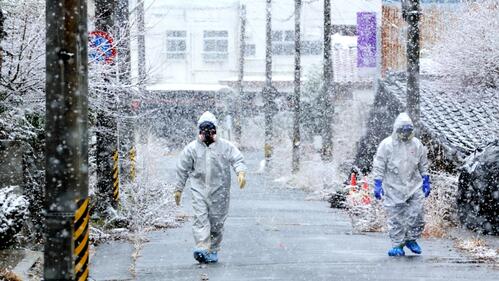Technological and biological hazards
Technological hazards originate from technological or industrial conditions, dangerous procedures, infrastructure failure or human activity. Chemical, biological, radiological and nuclear (CBRN) hazards are all types of technological hazards. They are commonly grouped together because they share lots of similarities, and many of the preparedness and response measures are the same or very similar. Learn more about these specific hazard types below.

CBRN hazards
- Chemical hazards are the unexpected release of a substance that is potentially harmful to humans, animals or the environment. They can happen due to technological accidents, the impact of natural hazards, conflict and terrorism.
- Biological hazards are biological substances that threaten the health of humans and other living beings. They include infectious disease outbreaks, epidemics, animal plagues and infestations. Contamination can occur through natural exposure to the agent, accidental release of microorganisms, for example from a research facility, or by deliberate acts.
- Nuclear hazards are hazards involving the accidental or intentional release of potentially harmful radioactive materials, for instance from nuclear power plants, research reactors or nuclear weapons.
- Radiological hazards are hazards involving all other sources of radiation—for instance, radiography machines, radioactive material used in industry and lost or stolen radioactive sources.
Do you know how to prepare for a technological hazard?
Assess and plan
Know the CBRN risks where you live, work, and where your children study and play. Are there any nuclear facilities or sites nearby with hazardous or toxic substances and, if so, what safety advice do authorities and companies provide? Familiarize yourself with warning and preparedness systems in your area, and identify any safe shelters within your community.
Reduce risks
Know the symbols that CBRN agents should be marked with and where CBRN hazards can be found, for instance when hazardous goods are being transported on road or rail. Consider CBRN risks when choosing where to live—are you within safe distances or in 'safe zones'? Familiarize yourself with potential evacuation routes. For nuclear and radiological emergencies, make sure you know where to get potassium iodide (KI) pills.
Prepare to respond
Avoid areas exposed to CBRN hazards as much as possible and follow any instructions issued by the authorities. If time permits before an evacuation, take important personal items with you such as medicines. If you are not getting reliable information from the authorities, it may be safer to shelter in place—houses with normal, solid construction can provide a high level of protection. Close and stay away from all windows and doors and keep monitoring communication channels for new information and advice. Learn how to decontaminate yourself and make sure you have access to uncontaminated food and water. If you believe yourself to be contaminated, seek medical attention as soon as possible.
